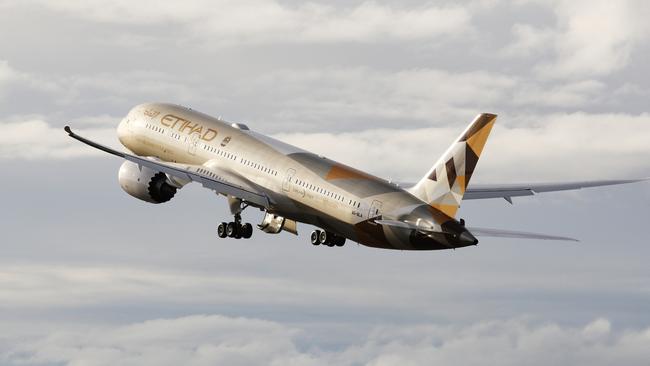Etihad Airways alters course as Hogan steps off
After piloting Etihad’s remarkable takeoff, James Hogan is stepping off just as the storm clouds start to gather.

The “transitioning” out of James Hogan from the international airline group that he built marks the looming end of an extraordinary era for Etihad Airways. It might also signal tough times for the trio of Middle Eastern airlines that have dramatically reshaped the global industry.
Etihad Aviation Group announced on Tuesday evening that Hogan would “step down” as president and CEO in the second half of this year, along with his chief financial officer, James Rigney, who arrived at Etihad with Hogan in 2006. They are said to be joining an investment company.
When the two Australians arrived at Etihad in 2006, it was a small, three-year-old, 22-plane regional business. Today, it operates 120 aircraft and is a major and valuable global brand. Etihad under Hogan has transformed Abu Dhabi into an important international aviation hub and, with the continuing rapid expansions of Emirates and Qatar, the Middle East into the power centre of the international industry.
Yet, after a restructuring of the group last year that separated some of its functions into discrete operating units and distanced Hogan from the operations, speculation kept strengthening that Hogan was on his way out.
The core element of the strategy Hogan developed to fast-track Etihad’s global growth was a variation on the “virtual network” strategies now pursued by a number of airlines that use codesharing alliances and route joint ventures rather than tying up capital in duplicated and competing capacity.
Etihad pursued that virtual network strategy but added a dimension to it by taking up a string of minority investments in partner airlines. It has large minority stakes in Air Berlin, Alitalia, India’s Jet Airways, Air Serbia, Air Seychelles, Austria’s NIKI and, of course, Virgin Australia.
The strategy worked to pour passenger volumes from the wider network through Abu Dhabi, while Hogan and his team leveraged Etihad’s capabilities and facilities to extract engineering and maintenance and procurement synergies by supporting the partner airlines.
Unhappily, the condition of the partner airlines meant that Etihad had to keep committing capital to them beyond its original investments. Air Berlin and Alitalia have had several restructurings and capital infusions but are still struggling and generating losses.
One could say something similar about Virgin, where the strategic shareholders have invested massive amounts of capital for minimal returns, although the trajectory of the Virgin business has improved now that the costly transformation from budget to full-service carrier has been completed.
It would appear that Abu Dhabi has lost patience with the strategy, albeit that the Etihad board said it remained committed to it.
“We must ensure that the airline is the right size and right shape,” said its chairman, Mohamed Mubarek Fadhel Al Mazrouei, in the statement announcing Hogan’s departure.
“We must continue to improve cost efficiency, productivity and revenue. We must progress and adjust our airline equity partnerships even as we remain committed to the strategy.”
Abu Dhabi, as with most of the Middle East economies, was hit by the fallout from the prolonged and heavy slump in oil prices as a result of OPEC’s ill-fated attempt to increase its market share by driving out US shale oil production.
The oil-rich states have been chewing through their reserves, raising the cost of public services and reducing their spending in response to the steep declines in their revenues.
The big lumps of capital tied up in the Etihad partnerships and the prospective demands for more from businesses that have been destroying capital would have been an increasingly visible issue over the past two years.
While the six-month production cuts by OPEC and some key non-OPEC producers that came into force at the start of the year have pushed the oil price up to around $US55 a barrel, which might be modestly positive for the emirates and their revenues but it isn’t good news for airlines, even though it is relatively low by quite recent standards.
The dramatic plunge in the oil price in 2014 was the primary driver of an unusual period of profitability for the global aviation industry. With fuel prices now well above their nadir levels of sub-$US30 a barrel and global interest rates also edging up, airline costs are rising, not falling. There is significant operational and financial leverage in airlines.
Moreover, industry-wide capacity growth is outstripping growth in passenger volumes. The industry, including (some would say especially) the Middle Eastern carriers, responded to the better conditions by increasing their fleets.
With the European economies weak, the UK impacted by Brexit and China (and Asia more generally) slowing, there is overcapacity on most of the major routes, driving down yields.
The strength of the US dollar for an industry which is exposed to US dollar fuel costs won’t help profitability, and nor will the election of Donald Trump to the US presidency.
The three big Middle Eastern carriers — Emirates, Etihad and Qatar — have been the targets of ferocious lobbying by the major US airlines, which want to halt their steady expansion into the US and which have alleged the airlines receive state-sponsored subsidies and engage in anti-competitive practices.
Whatever the veracity of those charges — which the Gulf carriers vehemently deny — the emergence of the aggressive protectionism of the Trump-led US doesn’t auger well for their prospects of expanding in the US.
Etihad’s emergence from nowhere to a leading global carrier with a first-rate fleet and reputation for service within the space of a decade under Hogan is a remarkable story.
Hogan himself referred to his tenure as only a “first chapter” in the Etihad story.
The next decade and chapter, for Etihad and its fellow Middle East hub carriers is likely to be significantly less expansionary than the first as their rates of growth slow and the focus on returns by their state sponsors — in what could be a tough and volatile period ahead for the global economy and for geopolitical stability — intensifies.




To join the conversation, please log in. Don't have an account? Register
Join the conversation, you are commenting as Logout